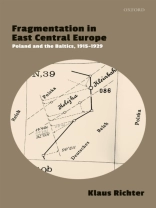The First World War led to a radical reshaping of Europe’s political borders. Nowhere was this transformation more profound than in East Central Europe, where the collapse of imperial rule led to the emergence of a series of new states. New borders intersected centuries-old networks of commercial, cultural, and social exchange. The new states had to face the challenges posed by territorial fragmentation and at the same time establish durable state structures withinan international order that viewed them as, at best, weak, and at worst, as merely provisional entities that would sooner or later be reintegrated into their larger neighbours’ territory. Fragmentation in East Central Europe challenges the traditional view that the emergence of these states was the product of a radical rupture that naturally led from defunct empires to nation states. Using the example of Poland and the Baltic States, it retraces the roots of the interwar states of East Central Europe, of their policies, economic developments, and of their conflicts back to the First World War. At the same time, it shows that these states learned to harness the dynamicscaused by territorial fragmentation, thus forever changing our understanding of what modern states can do.
Klaus Richter
Fragmentation in East Central Europe [PDF ebook]
Poland and the Baltics, 1915-1929
Fragmentation in East Central Europe [PDF ebook]
Poland and the Baltics, 1915-1929
购买此电子书可免费获赠一本!
语言 英语 ● 格式 PDF ● 网页 384 ● ISBN 9780192581631 ● 出版者 OUP Oxford ● 发布时间 2020 ● 下载 3 时 ● 货币 EUR ● ID 8201277 ● 复制保护 Adobe DRM
需要具备DRM功能的电子书阅读器












